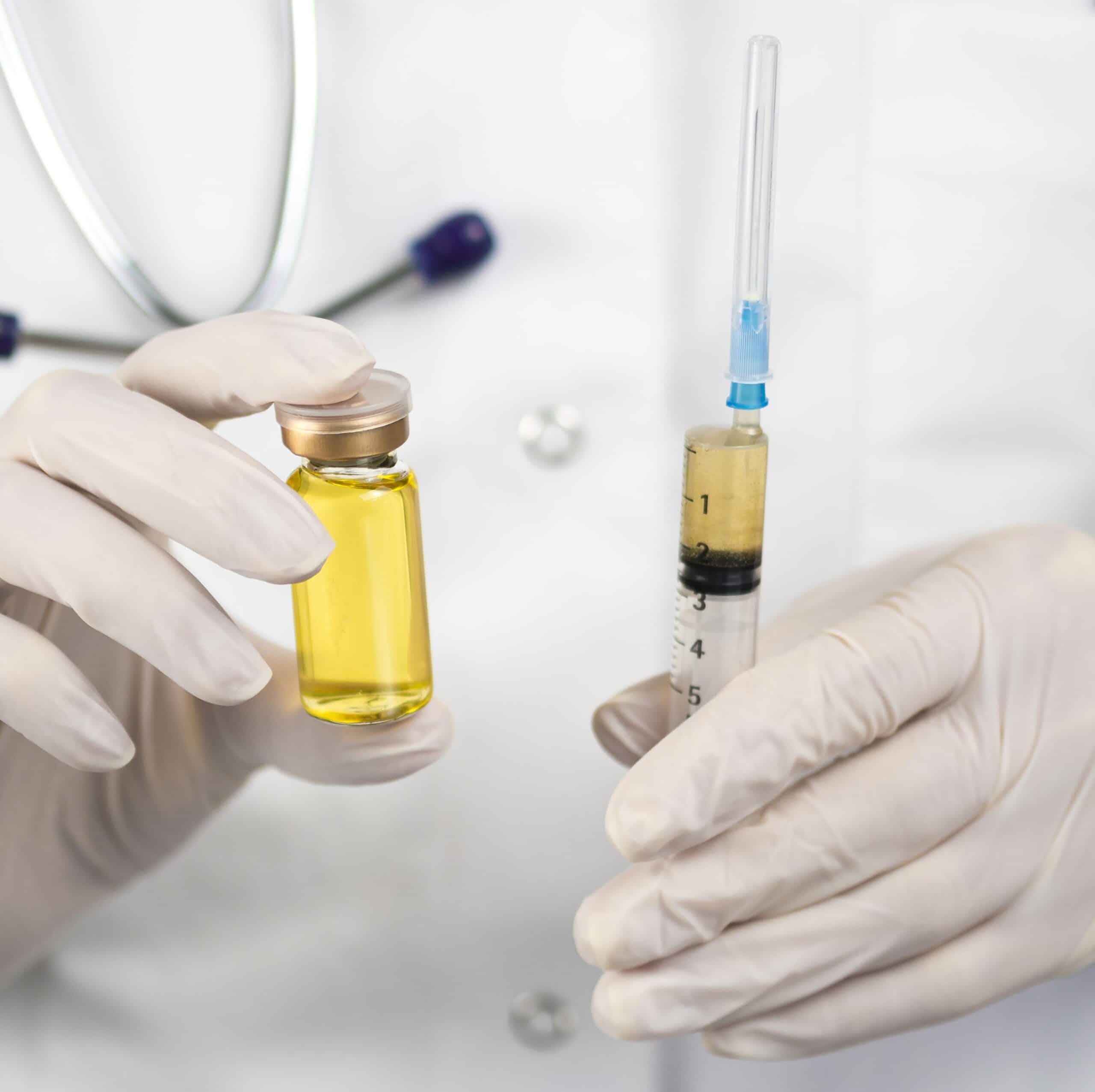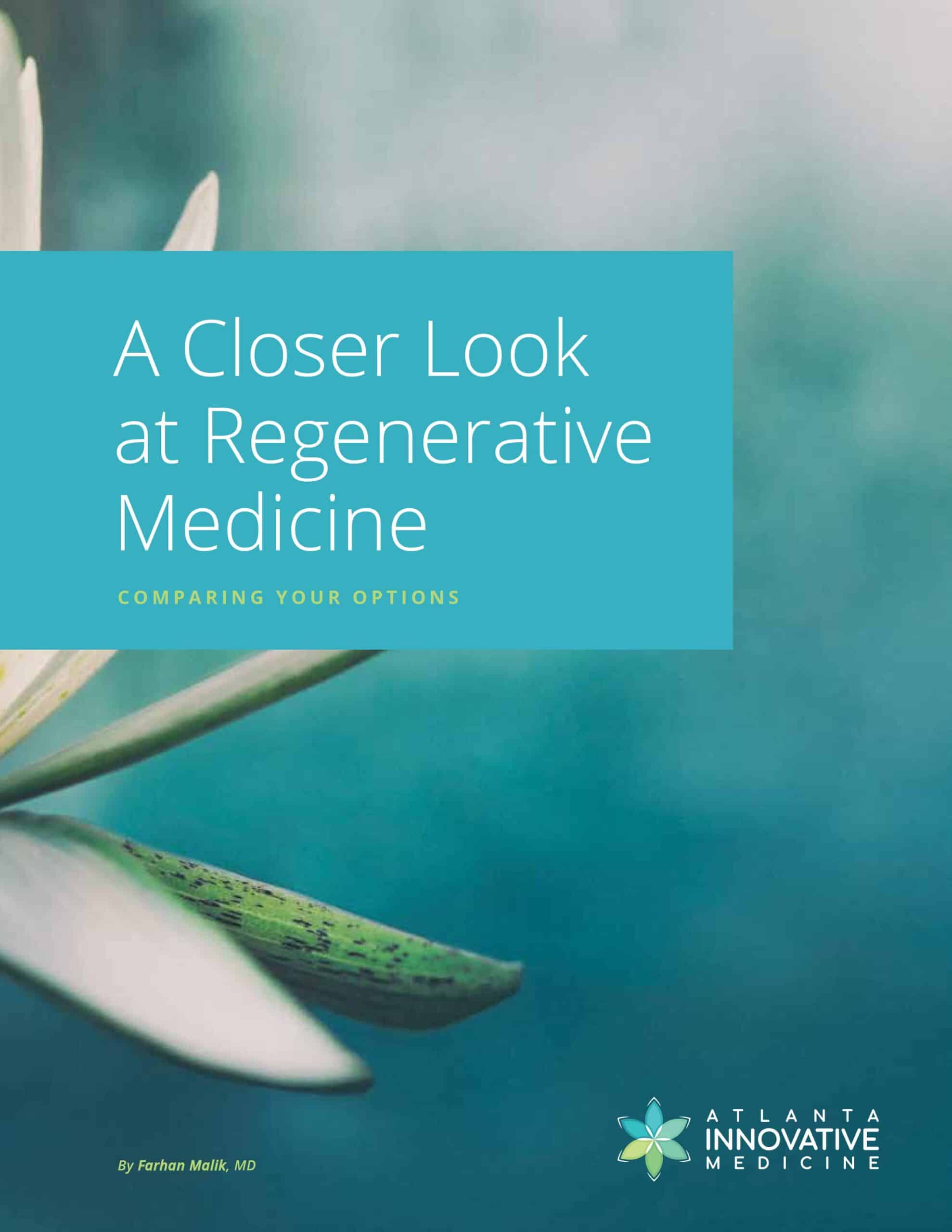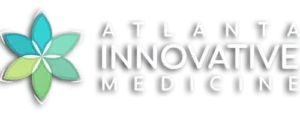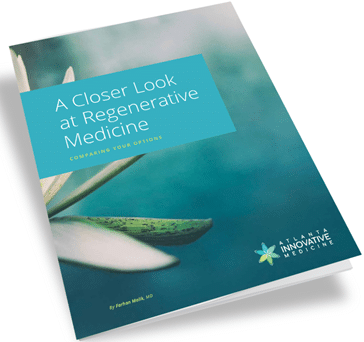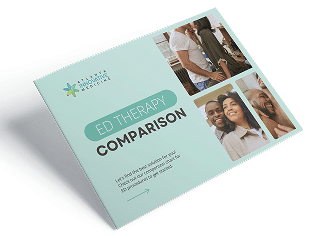By Farhan Malik, MD
Atlanta Innovative Medicine
In a world where healthcare constantly evolves, it’s surprising how long joint and soft tissue pain treatments have remained stagnant. Many people rely on temporary solutions like bracing, pain patches, medications, and steroid injections—methods that merely mask symptoms without addressing the underlying issues. It’s time to embrace therapies that not only alleviate pain but also promote healing and repair. Enter orthopedic stem cell therapy.
By harnessing the regenerative potential of mesenchymal stem cells (MSCs), scientists have conducted numerous preclinical studies, yielding impressive results that pave the way for further exploration and clinical applications. One challenge in orthopedic treatment is the complexity of musculoskeletal tissues, which include bones, joints, ligaments, tendons, and muscles—structures the body often struggles to repair effectively on its own. MSCs can differentiate into various tissue types, naturally enhancing the healing process for orthopedic injuries, musculoskeletal defects, and diseases.
At Atlanta Innovative Medicine, we are proud to be at the forefront of regenerative medicine, including cutting-edge stem cell treatments specifically designed for those battling persistent joint and soft tissue pain. In this blog, we’ll explore the science behind orthopedic stem cell therapy, its applications, its effectiveness, and the personalized care available at our clinic.
What Is Stem Cell Therapy?
Think of stem cells as your body’s repair squad. Located throughout the body, these “all-purpose” cells can duplicate and transform into various tissue types. However, our bodies often struggle to send enough stem cells to areas needing repair, particularly as we age. This is where orthopedic stem cell therapy comes into play, utilizing mesenchymal stem cells (MSCs) to potentially rejuvenate and heal damaged tissues.
Stem cells contribute to tissue regeneration through several mechanisms. MSCs have the unique ability to differentiate into various cell types, including cartilage, bone, and ligament cells, enabling them to replace damaged tissue. They release bioactive molecules such as cytokines, growth factors, and exosomes, which promote healing by reducing inflammation and attracting repair cells to the injury site. Additionally, stem cells play a crucial role in modulating the immune response, decreasing inflammation, and creating a favorable environment for tissue repair.
Furthermore, they facilitate angiogenesis—the formation of new blood vessels—thereby enhancing blood flow to damaged areas and accelerating the healing process. By supporting the production of the extracellular matrix, stem cells provide vital structural support for effective tissue regeneration. Through these mechanisms, stem cells effectively address the root causes of musculoskeletal injuries, promoting healing and restoring function beyond what traditional treatments can achieve.
At Atlanta Innovative Medicine, we primarily harvest stem cells from two sources: adipose tissue (body fat) and bone marrow. Both sources are effective; however, adipose tissue typically yields a higher volume of stem cells, making it an ideal choice for treating multiple injuries simultaneously. Adipose-derived MSCs have gained significant attention due to their abundance, ease of extraction, and increasing reports of successful regenerative outcomes.
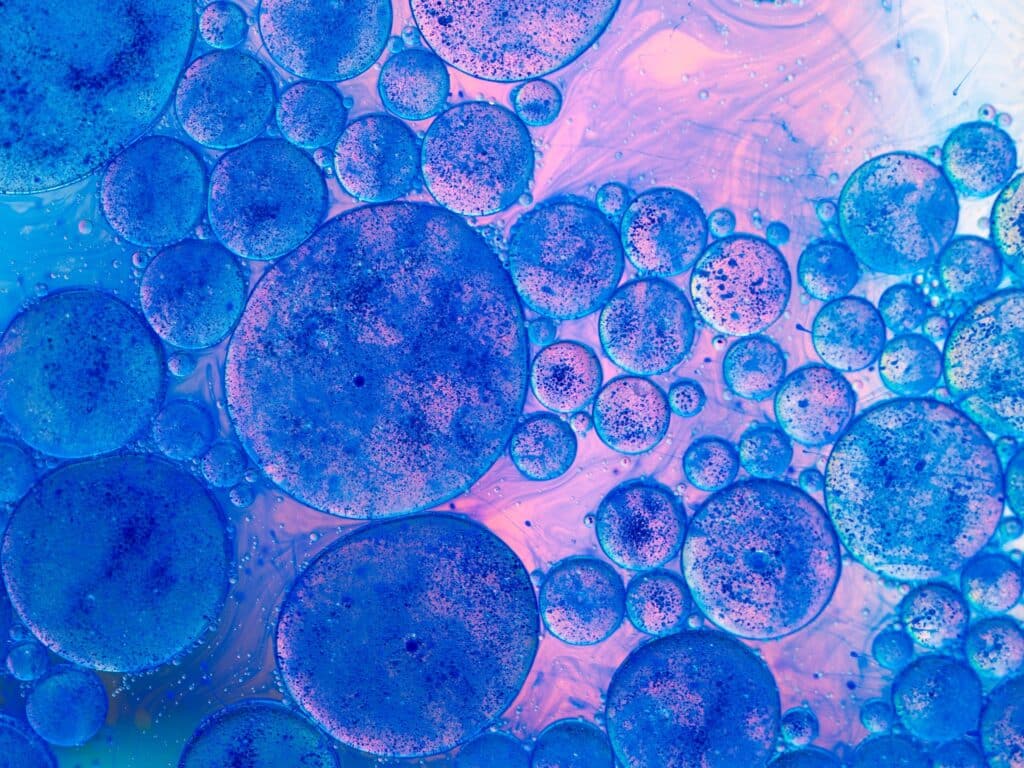
How Are Stem Cells Used in Orthopedics?
So, how does this therapy work? It begins with a straightforward, minimally invasive procedure in which our Medical Director, Dr. Farhan Malik, expertly collects stem cells from your body—either your hip for bone marrow or your abdomen for fat. This process typically takes about 30 minutes and can yield millions of stem cells enriched with essential growth factors, cytokines, and exosomes to jumpstart your healing process.
After extraction, the stem cells are prepared at the bedside using an FDA-compliant kit that efficiently concentrates the growth factors, stem cells, cytokines, and exosomes. This preparation can be called a “virtual orchestra” of regenerative elements, with some providers even dubbing it “Liquid Gold.”
Once the adipose or bone marrow tissue is prepared, our highly trained doctors inject it into the painful joint or soft tissue area using guided imaging. The entire process takes about 90 minutes, with the injection typically taking one hour, but the relief it provides can last long after your visit.
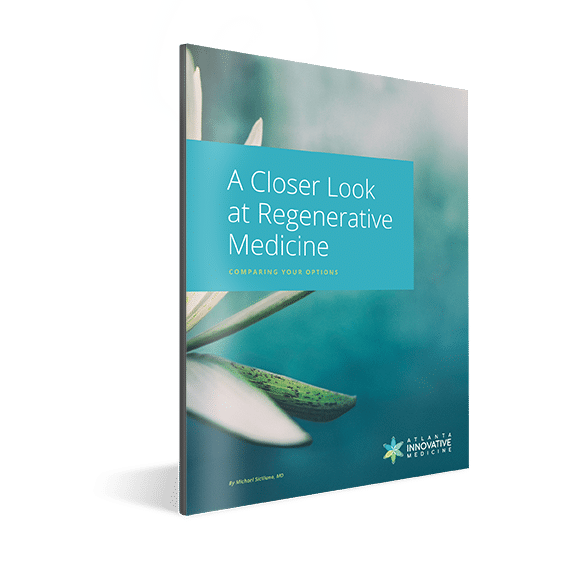
Subscribe for Expert Insights and Our Ebook
A Closer Look at Regenerative Medicine: Comparing Your Options Learn about treatment options like Platelet Rich Plasma (PRP), Prolozone Therapy, and Stem Cell Therapy.
What Conditions and Areas of the Body Does Stem Cell Therapy Treat?
At AIM, our experts recommend stem cell therapy for a variety of conditions and injuries. We find it a safe and highly effective option for treating joint and soft tissue pain. Orthopedic stem cell therapy can effectively address conditions such as:
- Osteoarthritis
- Tendonitis
- Rotator cuff injuries
- Meniscus injuries
- Anterior cruciate ligament (ACL) tears
- Bursitis
- Plantar fasciitis
- Tennis elbow (lateral epicondylitis)
- Chronic back pain
- Hip pain or labral tears
- Cartilage defects
- Joint sprains
Whether it’s your knees, hips, shoulders, spine, or ankles, our treatments are designed to restore movement and comfort, allowing you to return to the activities you love. Many of our patients have found relief and successfully avoided surgery through stem cell therapy.
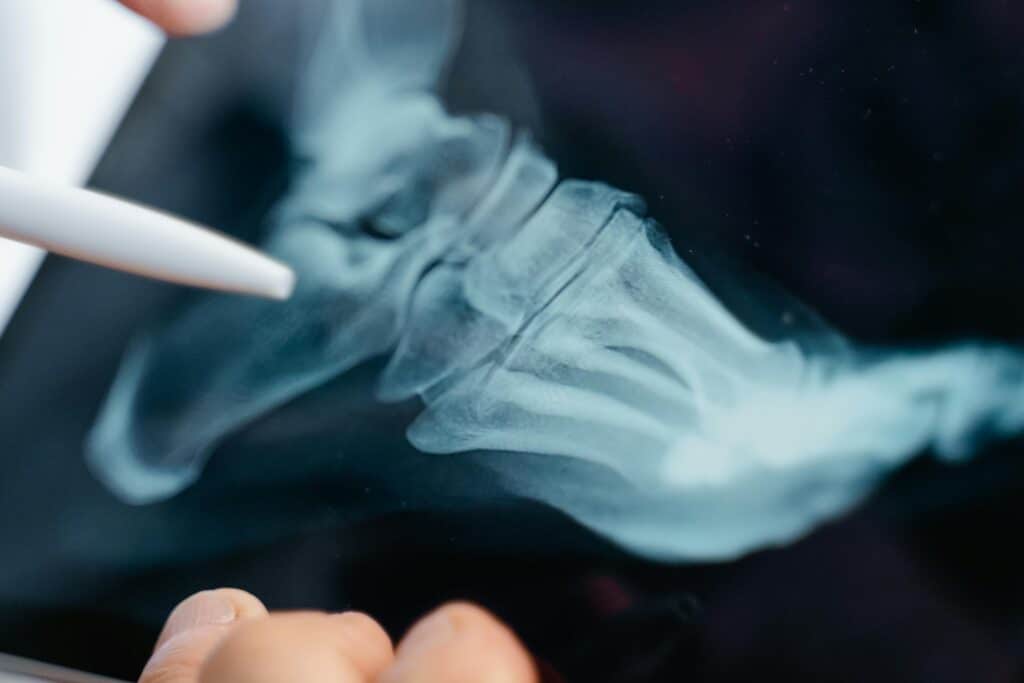
How Effective Is Stem Cell Therapy for Joint Pain?
Unlike traditional treatments like cortisone shots, which offer only temporary relief, orthopedic stem cell therapy targets the root problem. Preclinical studies have demonstrated overwhelming success in utilizing stem cells to promote the healing of sports injuries, bone fractures, tendon disorders, and osteoarthritis, to name a few. In one randomized, controlled clinical trial, patients with knee osteoarthritis showed significant pain relief and functional improvement after receiving stem cell injections in the knee.
Furthermore, studies involving microfracture patients have indicated improved outcomes for those who received surgical interventions and stem cell injections than those who underwent surgery alone.
While stem cell therapy has shown promising results for many patients, it’s important to have realistic expectations regarding treatment outcomes. Individual responses can vary based on factors such as the severity of the condition and adherence to post-treatment care. Many patients experience noticeable improvements within six to eight weeks. However, some may require additional sessions or supporting treatments to achieve optimal results.
It’s also crucial to address common misconceptions; stem cell therapy is not a guaranteed cure for all conditions, nor is it a quick fix. It is a regenerative treatment that promotes healing and recovery rather than simply masking symptoms. Patience and a comprehensive approach, including lifestyle modifications and ongoing care, are essential for achieving the best possible results.

Pros and Cons of Stem Cell Therapy vs. Surgery
While surgery can be effective, it often comes with its downsides. When comparing surgery to stem cell therapy, orthopedic stem cell therapy offers several advantages, including being less invasive, which leads to quicker recovery times and a lower risk of complications. Additionally, this therapy is highly well-tolerated by most patients and can potentially treat multiple areas in just one visit. However, its costs may vary, and not all procedures are covered by insurance. Furthermore, only some conditions may be suitable for this approach.
At Atlanta Innovative Medicine, we take the time to personalize your care plan, ensuring you receive the best treatment option for your unique circumstances. Although regenerative medicine treatments are typically not covered by insurance, we want our care to be as accessible as possible. We offer several payment and financing options, and we’re always ready to answer any questions you have about our procedures or payment methods.
How Long Does Stem Cell Therapy Last?
The duration of relief can vary from patient to patient and is influenced by factors like the severity of the condition and your commitment to post-treatment care. The good news is that many people report lasting benefits for months—often well beyond a year—after just one treatment.
Is Stem Cell Therapy Painful?
You might wonder, “Will this hurt?” The short answer is that most patients tolerate the procedure very well. While some mild discomfort can occur during stem cell extraction, we use local anesthetics to help minimize pain. Any soreness afterward is generally short-lived.
Who Is Not a Good Candidate for Stem Cell Therapy?
Stem cell therapy isn’t for everyone or every orthopedic condition. Despite its potential benefits, it may not be ideal for individuals with advanced joint degeneration or specific medical conditions. That’s why a thorough evaluation by our specialists at Atlanta Innovative Medicine is crucial to finding the best course of action for your specific needs.
Stem Cell Therapy at Atlanta Innovative Medicine
Orthopedic stem cell therapy is a game-changer in regenerative medicine. It offers a science-backed solution for healing and recovery without the usual risks associated with invasive procedures. The growing body of evidence supports its effectiveness and safety, and as research advances, we expect to uncover even more potential applications for this innovative treatment method.
At AIM, we pride ourselves on being at the forefront of these developments and are committed to providing safe and effective orthopedic treatments. By partnering with organizations like Regenexx, we enhance our ability to offer advanced procedures based on the latest research and patient outcomes.

If you’re seeking safe and innovative orthopedic treatments in the Atlanta area, we invite you to explore what AIM can do for you. Our dedicated team is here to guide you on your journey to recovery and help you reclaim your active lifestyle. Call us today at 770.416.9995 or book your free, 15-minute consultation online to learn more about how orthopedic stem cell therapy can transform your wellbeing.
Find Out if You’re a Candidate for Stem Cell Therapy Today!
Are you ready to take the next step toward alleviating your joint pain and enhancing your quality of life? Don’t let discomfort hold you back. Contact Atlanta Innovative Medicine to schedule your consultation, or get started with our simple quiz below:
Quizzes
Are you a candidate for Regenerative Medicine?
Regenerative medicine can be an effective therapy and treatment option for lasting pain relief for a variety of conditions like osteoarthritis of the knee, hip or shoulder; ACL or meniscus tears; tennis or golfer’s elbow; chronic neck and back pain; and more.
Is it right for you and your condition? Take 1 minute to answer a few “yes or no” questions that help to assess if you might be a candidate for PRP, stem cell or other nonsurgical regenerative treatments.
Are You a Stem Cell Candidate for Your Joint or Spine Damage?
Are you a candidate for Platelet Rich Plasma (PRP) Therapy?
Do I have nonsurgical options for my injured or aging joints?
Take the Pain Medications Risk Quiz
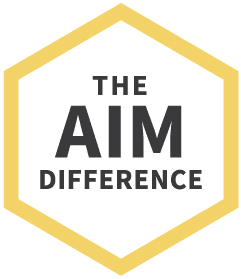
Regenerative Medicine.
Reimagined
- Advanced hybrid therapies, including Mesenchymal Stem Cell therapy combined with different mechanisms of action that synergistically come together to support ultimate healing
- More powerful PRP that’s customized, amplified and personalized
- Therapies delivered by an experienced, compassionate team comprised of multidisciplinary experts in traditional and alternative medicine working as your team: Medical Doctors, Nurse Practitioners, Physiotherapists and Chiropractors
- Advanced training through the American Academy of Orthopedic Medicine, the American Osteopathic Association of Prolotherapy Regenerative Medicine, and more
All content of this page is for informational purposes only and is not intended to serve as a substitute for the consultation, diagnosis, and/or medical treatment of a qualified physician or healthcare provider. Individual results may vary. Your medical professional can explain all the risks and potential benefits of any therapy based on your specific circumstances. At this time regenerative therapies are not FDA approved. Neither Atlanta Innovative Medicine nor its physician affiliates promise regenerative therapies as a cure for any condition, disease, or injury.
Other Atlanta Areas We Service:
© 2024 Atlanta Innovative Medicine, LLC. All Rights Reserved. AIM Scholarship Opportunity

